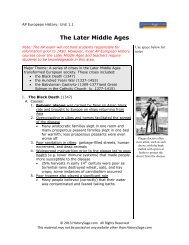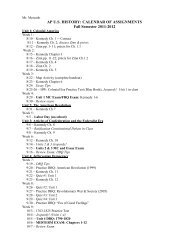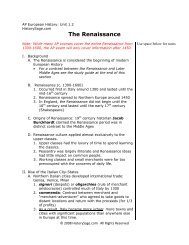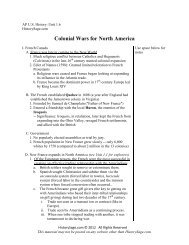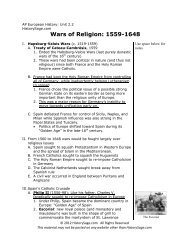Road to the American Revolution - historysage.com
Road to the American Revolution - historysage.com
Road to the American Revolution - historysage.com
Create successful ePaper yourself
Turn your PDF publications into a flip-book with our unique Google optimized e-Paper software.
AP U.S. His<strong>to</strong>ry: Unit 2.1<br />
His<strong>to</strong>rySage.<strong>com</strong><br />
<strong>Road</strong> <strong>to</strong> <strong>the</strong> <strong>American</strong> <strong>Revolution</strong><br />
I. The <strong>American</strong> colonies prior <strong>to</strong> <strong>the</strong> <strong>American</strong> <strong>Revolution</strong>.<br />
A. In 18 th century, large percentage of <strong>American</strong> colonists were<br />
proud <strong>to</strong> belong <strong>to</strong> British empire.<br />
1. Newer studies suggest that by 1763 <strong>the</strong> <strong>American</strong> colonies<br />
had achieved tremendous integration within <strong>the</strong> empire; did<br />
not forget <strong>the</strong>ir "Britishness"<br />
2. On average, <strong>American</strong>s had <strong>the</strong> highest standard of living in<br />
<strong>the</strong> world.<br />
a. Drop in price of British goods meant <strong>American</strong><br />
consumers had many choices.<br />
b. Landownership opportunities far better than in Europe.<br />
Use space below for<br />
notes<br />
B. "Salutary neglect" (beginning about 1713)<br />
1. Between 1713 and 1763 <strong>American</strong> colonials saw reduced<br />
gov't intervention in colonial affairs.<br />
a. Whig prime minister, Sir Robert Walpole, believed<br />
leaving <strong>the</strong> colonies alone <strong>to</strong> run <strong>the</strong>ir own affairs with<br />
little interference would produce more wealth and<br />
<strong>com</strong>merce, and cause less friction.<br />
b. Britain would provide peace, protection, <strong>com</strong>merce,<br />
ensure law and send more immigrants <strong>to</strong> America <strong>to</strong><br />
increase numbers of cus<strong>to</strong>mers.<br />
c. Britain was focused on major wars in Europe.<br />
d. Colonies left <strong>to</strong> raise, equip & train own militia for<br />
protection against Amerindians.<br />
e. In effect, colonies left alone; had <strong>to</strong> develop self-reliance;<br />
effective organization<br />
2. Development of self-government<br />
a. 13 separate colonial governments emerged; often<br />
undermined <strong>the</strong> authority of Parliament.<br />
b. Local gov't was much more responsive <strong>to</strong> local needs<br />
c. <strong>American</strong>s became used <strong>to</strong> regulating <strong>the</strong>ir own affairs<br />
without significant interference.<br />
d. <strong>American</strong> manufacturing increased despite British policies<br />
<strong>to</strong> protect British manufacturers (Navigation Laws)<br />
-- Cost of <strong>American</strong> goods increased making merchants<br />
wealthy.<br />
3. Smuggling was rampant as British regulation became lax in<br />
18 th century.<br />
© 2012 His<strong>to</strong>rySage.<strong>com</strong> All Rights Reserved<br />
This material may not be posted on any website o<strong>the</strong>r than His<strong>to</strong>rySage.<strong>com</strong>.
His<strong>to</strong>rySage.<strong>com</strong> APUSH Lecture Notes Page 2<br />
Unit 2.1<strong>Road</strong> <strong>to</strong> <strong>Revolution</strong><br />
C. Violent protests by western colonists <strong>to</strong>ward eastern authority<br />
continued.<br />
1. Pax<strong>to</strong>n Boys (1764): Philadelphia Scots Irish dissenters<br />
revolted against Quaker leniency regarding gov’t Indian policy:<br />
-- 20 peaceful Indians killed, followed by a march on<br />
Philadelphia demanding better representation, protection<br />
against Indians on <strong>the</strong> frontier, and funds for internal<br />
improvements.<br />
2. Regula<strong>to</strong>r Movement (1771)<br />
a. Eastern farmers in North Carolina were frustrated with<br />
British tax policies, inadequate representation of western<br />
farmers in <strong>the</strong> colonial assembly, and legislation favoring<br />
wealthy planters in <strong>the</strong> east.<br />
b. Fighting lasted for three years.<br />
3. These two rebellions were similar <strong>to</strong> Bacon's & Leisler's<br />
rebellions in <strong>the</strong> 17 th century and two future rebellions:<br />
Shays’s Rebellion in 1787 and Whiskey Rebellion in 1794.<br />
Use space below for<br />
notes:<br />
II. The Mercantilist System<br />
A. Mercantilism: Colonies existed for benefit of <strong>the</strong> mo<strong>the</strong>r country<br />
1. Colonies should add <strong>to</strong> empire's wealth, prosperity, and selfsufficiency.<br />
2. Colonies' benefit <strong>to</strong> Great Britain<br />
a. Ensure British naval supremacy by providing ships,<br />
ships' s<strong>to</strong>res, sailors and trade.<br />
b. Provide raw materials: <strong>to</strong>bacco, indigo, lumber, fish, etc.<br />
c. Provide a large consumer market for British goods.<br />
d. Keep gold & silver in <strong>the</strong> empire through economic selfsufficiency.<br />
-- Britain would not need <strong>to</strong> purchase good from foreign<br />
countries.<br />
B. Navigation Laws<br />
1. Purpose: enforce Britain’s mercantilist system<br />
2. Motive: First enacted in 1651; aimed at rival Dutch shippers<br />
who were active in <strong>the</strong> <strong>American</strong> trade.<br />
3. Basic provisions of Navigation Laws passed in 17 th and 18 th<br />
centuries:<br />
a. Restricted <strong>com</strong>merce <strong>to</strong> and from <strong>the</strong> colonies <strong>to</strong> English<br />
or <strong>American</strong> vessels only.<br />
b. Certain "enumerated" articles like <strong>to</strong>bacco couldn’t be<br />
shipped <strong>to</strong> any o<strong>the</strong>r foreign market except England,<br />
despite higher prices in o<strong>the</strong>r markets.<br />
c. All European goods going <strong>to</strong> America had <strong>to</strong> go through<br />
England first.<br />
© 2012 His<strong>to</strong>rySage.<strong>com</strong> All Rights Reserved
His<strong>to</strong>rySage.<strong>com</strong> APUSH Lecture Notes Page 3<br />
Unit 2.1<strong>Road</strong> <strong>to</strong> <strong>Revolution</strong><br />
d. Certain restrictions on colonial manufactures for export:<br />
British did not want manufacturing <strong>com</strong>petition with <strong>the</strong><br />
colonies.<br />
i. Forbade exportation of woolen cloth produced in<br />
America.<br />
ii. Beaver hats prohibited from exportation<br />
iii. Encouraged colonists <strong>to</strong> produce pig and bar iron, but<br />
not build any new steel furnaces, slitting mills, or<br />
plating forges.<br />
e. Molasses Act (1733) -- Imposed heavy duties on all<br />
molasses, rum and sugar imported form French Caribbean.<br />
i. Colonists traded heavily with <strong>the</strong> French West Indies<br />
ii. Some rum produced in America was traded for slaves<br />
-- New England merchants heavily involved in slave<br />
trade<br />
Use space below for<br />
notes:<br />
C. Positive results of British Mercantilism<br />
1. Until 1763, Navigation Laws did not adversely impact <strong>the</strong><br />
colonial economy.<br />
2. Colonials had rights of Englishmen and opportunities for selfgovernment<br />
(salutary neglect)<br />
3. Colonies had British military protection free of charge<br />
4. Colonies greatly profited from manufacturing and trading.<br />
D. Negative impact of mercantilism<br />
1. Colonial manufacturing was hindered by British policies.<br />
2. Sou<strong>the</strong>rn colonies suffered as export prices dropped due <strong>to</strong><br />
"enumeration."<br />
-- Virginia especially affected; poor economic conditions<br />
resulted in unrest<br />
3. New England resented favorable British policies <strong>to</strong>ward<br />
Sou<strong>the</strong>rn colonies (who produced <strong>to</strong>bacco, sugar and rice).<br />
4. Writs of Assistance<br />
a. Search warrants by British cus<strong>to</strong>ms officers harassed<br />
colonial shipping.<br />
b. Aimed <strong>to</strong> reduce colonial smuggling (e.g. illegal triangular<br />
trade.)<br />
c. 1761, James Otis, a young Bos<strong>to</strong>n lawyer, demanded<br />
Parliament repeal <strong>the</strong> acts.<br />
i. Parliament refused but Otis’ efforts gained press<br />
throughout <strong>the</strong> colonies.<br />
ii. Later, Otis wrote famous words "no taxation without<br />
representation."<br />
© 2012 His<strong>to</strong>rySage.<strong>com</strong> All Rights Reserved
His<strong>to</strong>rySage.<strong>com</strong> APUSH Lecture Notes Page 4<br />
Unit 2.1<strong>Road</strong> <strong>to</strong> <strong>Revolution</strong><br />
E. End of "salutary neglect"<br />
1. 1763 marked a new era in relations between England <strong>the</strong> colonies<br />
a. George Grenville new Prime Minister, sought <strong>to</strong> enforce<br />
Navigation Acts.<br />
-- <strong>American</strong>s particularly angry about increased authority of<br />
admiralty courts that could now try smugglers, tax evaders,<br />
ship owners, and o<strong>the</strong>rs accused of violating <strong>com</strong>mercial<br />
restrictions; no trial by jury; located in Nova Scotia.<br />
b. British debt from <strong>the</strong> Seven Years' War was enormous<br />
i. Half <strong>the</strong> debt due <strong>to</strong> protection of <strong>the</strong> colonies<br />
ii. British thought colonists should pay 1/3 of maintaining a<br />
garrison of 10,000 British soldiers <strong>to</strong> protect against Indian<br />
uprisings.<br />
2. King George III<br />
a. Very stubborn and surrounded himself with gov’t officials<br />
that were often inexperienced, selfish & narrow-minded.<br />
-- 5 different prime ministers during 1 st 10 years of his reign.<br />
b. Sought <strong>to</strong> exercise increased control over <strong>the</strong> colonies.<br />
c. 50 years of Whig power was about <strong>to</strong> give way <strong>to</strong> a<br />
conservative gov’t dominated by <strong>the</strong> king beginning in 1762.<br />
3. Proclamation of 1763<br />
a. Prohibited colonials <strong>to</strong> move west of <strong>the</strong> Appalachians<br />
b. British aim: Settle land disputes with Amerindians fairly <strong>to</strong><br />
prevent future uprisings like Pontiac's Rebellion.<br />
c. Colonials infuriated<br />
i. Many veterans had fought in <strong>the</strong> war and felt betrayed<br />
ii. Land specula<strong>to</strong>rs believed <strong>American</strong>s should have access <strong>to</strong><br />
lands.<br />
d. Colonists generally ignored <strong>the</strong> Proclamation<br />
4. Currency Act (1764)<br />
a. British restricted colonial printing of paper money<br />
-- Wanted colonists <strong>to</strong> pay back debts and taxes with hard<br />
currency (gold and silver).<br />
b. Trade deficit between England & America hurt <strong>the</strong> colonies<br />
i. Most gold & silver flowed <strong>to</strong> England from colonies since<br />
<strong>the</strong> colonies imported more than <strong>the</strong>y exported.<br />
ii. Lack of gold meant lack of hard cash; bartering increased<br />
5. Sugar Acts, 1764 (updated version of Molasses Act of 1733)<br />
a. First act ever passed specifically that raised revenue for <strong>the</strong><br />
crown.<br />
b. Aimed <strong>to</strong> regulate <strong>the</strong> illegal triangular trade by collecting<br />
duties that <strong>the</strong> colonists had not paid for many years.<br />
c. Reduced taxes on molasses but taxed all molasses, not just<br />
molasses from French West Indies.<br />
d. Not enforced effectively; duties eventually lowered after Stamp<br />
Act crisis.<br />
Use space below for<br />
notes:<br />
© 2012 His<strong>to</strong>rySage.<strong>com</strong> All Rights Reserved
His<strong>to</strong>rySage.<strong>com</strong> APUSH Lecture Notes Page 5<br />
Unit 2.1<strong>Road</strong> <strong>to</strong> <strong>Revolution</strong><br />
6. Quartering Act, 1765: Certain colonies required <strong>to</strong> provide food<br />
& quarters for British troops.<br />
Use space below for<br />
notes:<br />
III. Three great crises in <strong>the</strong> colonies led <strong>to</strong> <strong>the</strong> <strong>American</strong><br />
<strong>Revolution</strong>: Stamp Act, Townshend Acts, & Tea Act<br />
A. The Stamp Act of 1765 -- Perhaps <strong>the</strong> single most important event<br />
leading <strong>to</strong> <strong>the</strong> <strong>American</strong> <strong>Revolution</strong><br />
1. Purpose: Raise revenues <strong>to</strong> support new military force in <strong>the</strong><br />
colonies<br />
2. Provisions:<br />
a. Official stamps on paper would serve as proof of payment.<br />
b. Tax applied <strong>to</strong> published materials and legal documents e.g.,<br />
pamphlets, newspapers, diplomas, bills of lading, marriage<br />
certificates, death certificates, mortgages, insurance policies,<br />
liquor licenses, & playing cards.<br />
c. Both Sugar Act and Stamp Act provided for trying offenders in<br />
admiralty courts where juries were not allowed<br />
-- Burden of proof on defendants; were assumed guilty unless<br />
proved innocent.<br />
3. Grenville’s' view<br />
a. Stamp Act was reasonable and just<br />
b. Only required colonials <strong>to</strong> pay fair share for colonial defense<br />
c. Stamp Act in Britain had been much heavier and in effect for<br />
about 50 years.<br />
4. Virginia Resolves (led by Patrick Henry)<br />
a. VA leaders believed Stamp Act attacked colonial's rights as<br />
Englishmen<br />
b. 5 of Henry’s 7 resolutions adopted by <strong>the</strong> House of Burgesses<br />
including non-importation.<br />
c. Claimed that Virginia could only be taxed by Virginians.<br />
-- "No taxation w/o representation"<br />
d. Assemblies of 8 o<strong>the</strong>r colonies passed resolutions similar <strong>to</strong><br />
Virginia’s.<br />
5. Colonist views distinguished between "legislation" and "taxation"<br />
a. Legislation, "external taxes," <strong>the</strong> right of Parliament<br />
regarding <strong>the</strong> empire; e.g. cus<strong>to</strong>ms duties (tariffs)<br />
b. Taxation, "internal taxes," exclusive right of local<br />
representative gov't.<br />
-- British taxation was robbery; attacking sacred rights of<br />
property<br />
c. Grenville’s response: colonies had "virtual representation" in<br />
Parliament<br />
-- All British subjects were represented, even those who did not<br />
vote for members in Parliament.<br />
© 2012 His<strong>to</strong>rySage.<strong>com</strong> All Rights Reserved
His<strong>to</strong>rySage.<strong>com</strong> APUSH Lecture Notes Page 6<br />
Unit 2.1<strong>Road</strong> <strong>to</strong> <strong>Revolution</strong><br />
d. Colonists dismissed "virtual representation"<br />
i. "No taxation w/o representation"<br />
ii. Did not really want "direct representation" (actual<br />
representation)<br />
-- Would mean increased taxes (as in Britain)<br />
-- Increased responsibilities <strong>to</strong> <strong>the</strong> crown<br />
-- Colonial reps. would be heavily outnumbered in<br />
Parliament<br />
6. Stamp Act Congress (1765) -- brought <strong>to</strong>ge<strong>the</strong>r 27 delegates<br />
from 9 colonies<br />
a. Massachusetts invited colonies who adopted Virginia<br />
Resolves <strong>to</strong> meet.<br />
b. Drew up a statement of <strong>the</strong>ir rights and grievances and<br />
demanded that <strong>the</strong> king and Parliament rescind <strong>the</strong> Stamp Act.<br />
c. Largely ignored in England; of little consequence in <strong>the</strong><br />
colonies<br />
d. Significance: Brought <strong>to</strong>ge<strong>the</strong>r reps from different & rival<br />
colonies and set precedent for future resistance <strong>to</strong> British rule.<br />
-- Helped break down sectional suspicions within <strong>the</strong> colonies.<br />
e. Non-importation agreements against British goods.<br />
-- England economy suffered from non-importation but nonimportation<br />
was not decisive in reversing Parliament’s<br />
decision<br />
7. Sons of Liberty led by Samuel Adams violently enforced<br />
nonimportation agreements against viola<strong>to</strong>rs; (tarring &<br />
fea<strong>the</strong>ring was one painful tactic).<br />
a. Houses of pro-Brisith officials vandalized, <strong>the</strong>ft occurred,<br />
and <strong>the</strong> warehouse where stamps were s<strong>to</strong>red was destroyed.<br />
b. All stamp act agents were forced <strong>to</strong> resign; no one risked<br />
selling stamps.<br />
8. Stamp Act repealed in 1766<br />
a. Lord Rockingham saw <strong>the</strong> Stamp Act as a possible cause of<br />
civil crisis and and encouraged British merchants <strong>to</strong> write<br />
Parliament <strong>to</strong> rescind <strong>the</strong> tax. (Rockingham replaced Grenville)<br />
b. Parliament passed <strong>the</strong> Declara<strong>to</strong>ry Act at <strong>the</strong> same time<br />
i. Purpose was partly <strong>to</strong> save face<br />
ii. Claimed Parliament had right <strong>to</strong> tax colonies in <strong>the</strong> future.<br />
c. Sugar Act tax was also lowered significantly<br />
d. Stamp Act rebellion proved Parliament could be persuaded <strong>to</strong><br />
yield <strong>to</strong> <strong>American</strong> boycotts and mob action<br />
B. Townshend Acts (1767)<br />
1. Charles Townshend <strong>to</strong>ok control of Parliament and sought <strong>to</strong><br />
Punish <strong>the</strong> colonies for <strong>the</strong> Stamp Act uprising.<br />
2. Provisions:<br />
a. Small import duty placed on glass, white lead, paper, paint,<br />
© 2012 His<strong>to</strong>rySage.<strong>com</strong> All Rights Reserved
His<strong>to</strong>rySage.<strong>com</strong> APUSH Lecture Notes Page 7<br />
Unit 2.1<strong>Road</strong> <strong>to</strong> <strong>Revolution</strong><br />
silk and tea.<br />
-- Tax was an indirect cus<strong>to</strong>ms duty ("external tax")<br />
b. Revenues from taxes <strong>to</strong> pay salaries of royal governors and<br />
judges<br />
c. Established a <strong>com</strong>mission and vice-admiralty courts for<br />
enforcement.<br />
-- Royal judges would be allowed <strong>to</strong> grant "writs of assistance"<br />
in private homes, shops or warehouses.<br />
3. Colonial reaction was negative<br />
a. Colonies angrily interpreted <strong>the</strong> act as an inappropriate tax <strong>to</strong><br />
raise revenue and pay royal salaries.<br />
-- Colonists especially hated <strong>the</strong> tax on tea.<br />
b. John Dickinson, Letters from a Farmer in Pennsylvania<br />
i. Challenged distinction between "internal" and "external"<br />
taxes.<br />
ii. Denied right <strong>to</strong> levy taxes for purpose of revenue.<br />
iii. Prompted <strong>the</strong> Massachusetts Circular Letter<br />
4. Massachusetts Circular Letter (Feb. 1768)<br />
a. Massachusetts legislature, urged by Sam Adams and James<br />
Otis, supported Dickinson's arguments and called for o<strong>the</strong>r<br />
colonies <strong>to</strong> pass petitions calling for Parliament <strong>to</strong> repeal <strong>the</strong><br />
Townshend Acts.<br />
b. In response, British sent troops <strong>to</strong> Bos<strong>to</strong>n and<br />
threatened <strong>to</strong> dissolve Massachusetts' legislature if <strong>the</strong> letter<br />
not retracted.<br />
-- O<strong>the</strong>r colonies that voted for <strong>the</strong> circular would be dissolved.<br />
c. Some colonies reenacted previous nonimportation agreements<br />
-- British exports <strong>to</strong> America fell 40% over <strong>the</strong> next few<br />
months.<br />
d. Several colonial legislatures dissolved as <strong>the</strong>y supported<br />
Massachusetts: MA, MD, VA, DE, SC<br />
5. Bos<strong>to</strong>n "Massacre"<br />
a. (Peaceful) arrival of troops in Bos<strong>to</strong>n aroused <strong>American</strong><br />
resistance<br />
-- Colonials fearful of standing armies; believed Britain sought<br />
<strong>to</strong> suppress colonial liberties.<br />
b. March 5, 1770 British soldiers (having been provoked) fired<br />
on a crowd<br />
i. Eleven civilians killed or wounded<br />
ii. Crispus Attucks, a mulat<strong>to</strong> merchant seaman, <strong>the</strong> "first <strong>to</strong><br />
die in <strong>the</strong> revolution," and alleged leader of <strong>the</strong> unruly mob.<br />
iii. Word of <strong>the</strong> "massacre" spread throughout <strong>the</strong> colonies (esp.<br />
by Sons of Liberty)<br />
iv. Colonial propaganda grossly exaggerated <strong>the</strong> event.<br />
6. Townshend Acts repealed<br />
a. Lord North, bowing <strong>to</strong> pressure, got Parliament <strong>to</strong> repeal <strong>the</strong><br />
© 2012 His<strong>to</strong>rySage.<strong>com</strong> All Rights Reserved
His<strong>to</strong>rySage.<strong>com</strong> APUSH Lecture Notes Page 8<br />
Unit 2.1<strong>Road</strong> <strong>to</strong> <strong>Revolution</strong><br />
act in 1770.<br />
i. Nonimportation agreements were pinching British<br />
manufacturers<br />
ii. Three-pence tax on tea remained <strong>to</strong> demonstrate Parliament's<br />
right <strong>to</strong> tax.<br />
-- Taxed tea still cost less than smuggled tea.<br />
b. Half <strong>the</strong> troops in Bos<strong>to</strong>n removed.<br />
c. Until 1773, relations improved after Townshend Acts were<br />
repealed.<br />
7. Gaspee Incident (1771) one of only a few incidents between<br />
1770-1773 <strong>to</strong> cause conflict<br />
a. British warship "Gaspee" ran aground near in RI, pursuing<br />
smugglers.<br />
-- Ship was no<strong>to</strong>rious for ex<strong>to</strong>rting smaller vessels and<br />
allowing men <strong>to</strong> steal cattle and cut fruit trees on local farms<br />
for firewood.<br />
b. Sons of Liberty members, dressed as Indians, <strong>to</strong>ok crew off <strong>the</strong><br />
ship and set it on fire; <strong>the</strong> <strong>com</strong>mander was wounded<br />
c. "Gaspee" Commission was created <strong>to</strong> seek retribution<br />
but could not find <strong>the</strong> guilty parties; would have sent <strong>the</strong>m <strong>to</strong><br />
England for trial.<br />
8. Committees of Correspondence<br />
a. Some colonial discontent continued as British redoubled efforts<br />
<strong>to</strong> enforce <strong>the</strong> Navigation Laws.<br />
b. Samuel Adams used propaganda <strong>to</strong> whip up colonial<br />
resentment<br />
c. Adams organized local <strong>com</strong>mittees of correspondence in Mass.,<br />
Nov, 1772.<br />
d. Chief function was <strong>to</strong> spread propaganda and information by<br />
interchanging letters in order <strong>to</strong> keep opposition <strong>to</strong> British<br />
policy alive.<br />
e. In particular, letters from British gov't including those of Gov.<br />
Hutchinson showed that Britain was acting on Hutchinson's<br />
advice and wishes.<br />
f. Intercolonial <strong>com</strong>mittees of correspondence emerged<br />
g. Intercolonial groups evolved directly in<strong>to</strong> <strong>the</strong> first <strong>American</strong><br />
congresses.<br />
C. The Tea Act Crisis and <strong>the</strong> First Continental Congress<br />
1. Tea Act (1773)<br />
a. British gov't granted British East India Company a monopoly<br />
of <strong>the</strong> <strong>American</strong> tea trade.<br />
i. BEIC on <strong>the</strong> verge of bankruptcy which would have cost<br />
<strong>the</strong> British government huge revenues.<br />
ii. Price of tea would be even lower than existing prices, even<br />
with <strong>the</strong> tax.<br />
© 2012 His<strong>to</strong>rySage.<strong>com</strong> All Rights Reserved
His<strong>to</strong>rySage.<strong>com</strong> APUSH Lecture Notes Page 9<br />
Unit 2.1<strong>Road</strong> <strong>to</strong> <strong>Revolution</strong><br />
b. <strong>American</strong>s reacted angrily: saw Tea Act as an attempt <strong>to</strong> trick<br />
colonies in<strong>to</strong> accepting <strong>the</strong> tax through cheaper tea.<br />
2. Bos<strong>to</strong>n Tea Party, Dec. 16, 1773<br />
-- Sons of Liberty, dressed as Indians, boarded three ships,<br />
smashed 342 chests open, and dumped <strong>the</strong> tea in<strong>to</strong> <strong>the</strong> harbor.<br />
3. "In<strong>to</strong>lerable Acts" (Coercive Acts), 1774<br />
a. 1774, Parliament passed <strong>the</strong> Coercive Acts <strong>to</strong> punish Bos<strong>to</strong>n.<br />
b. Bos<strong>to</strong>n Port Act: harbor remained closed until damages were<br />
paid and law and order res<strong>to</strong>red.<br />
c. Massachusetts charter revoked<br />
i. King had power <strong>to</strong> appoint <strong>the</strong> Governor's Council, not <strong>the</strong><br />
assembly<br />
ii. Forbade <strong>to</strong>wn meetings except for election of <strong>to</strong>wn<br />
officials.<br />
d. Enforcing officials who killed colonists could now be tried in<br />
England instead of <strong>the</strong> colonies (<strong>the</strong>reby avoiding colonial<br />
justice).<br />
e. Quartering Act: Provided for <strong>the</strong> quartering of troops once<br />
again in Bos<strong>to</strong>n.<br />
4. Quebec Act, 1774<br />
a. Coincidentally ac<strong>com</strong>panied "In<strong>to</strong>lerable Acts"; not<br />
intended <strong>to</strong> punish <strong>the</strong> colonies<br />
b. French in Canada were guaranteed right <strong>to</strong> practice Catholicism<br />
c. Quebec terri<strong>to</strong>ry was extended down <strong>to</strong> <strong>the</strong> Ohio river, next <strong>to</strong><br />
NY & PA<br />
c. French allowed <strong>to</strong> keep old cus<strong>to</strong>ms and institutions which did<br />
not include a representative assembly or trial by jury in civil<br />
cases.<br />
d. The act was actually an enlightened extension of British<br />
freedoms.<br />
e. Colonial reaction:<br />
-- Viewed act as insidious attempt <strong>to</strong> create a new French<br />
Canadian and Amerindian threat in <strong>the</strong> Ohio Valley region.<br />
-- Anti-Catholic sentiment arose; seen as an attack on<br />
Protestantism<br />
5. The First Continental Congress, 1774<br />
a. In response <strong>to</strong> "In<strong>to</strong>lerable Acts," <strong>the</strong> <strong>com</strong>mittees of<br />
correspondence urged <strong>the</strong> colonies <strong>to</strong> act quickly.<br />
b. Bos<strong>to</strong>nians agreed <strong>to</strong> end all trade with Great Britain and<br />
invited o<strong>the</strong>r colonies <strong>to</strong> join <strong>the</strong> resistance.<br />
c. First Continental Congress deliberated from in <strong>the</strong> fall of 1774<br />
i. 12 of 13 colonies present (except Georgia)<br />
ii. Delegates included S.Adams, J. Adams, G. Washing<strong>to</strong>n, &<br />
Patrick Henry.<br />
d. 1st Step: endorse several resolutions known as <strong>the</strong> Suffolk<br />
Resolves.<br />
© 2012 His<strong>to</strong>rySage.<strong>com</strong> All Rights Reserved
His<strong>to</strong>rySage.<strong>com</strong> APUSH Lecture Notes Page 10<br />
Unit 2.1<strong>Road</strong> <strong>to</strong> <strong>Revolution</strong><br />
i. Denounced "In<strong>to</strong>lerable" Acts<br />
ii. Urged colonies <strong>to</strong> organize militia for defensive purposes<br />
iii. Called on colonies <strong>to</strong> suspend all trade with rest of British<br />
empire<br />
iv. Urged citizens not <strong>to</strong> pay taxes.<br />
e. Rejection of Galloway Plan<br />
i. Joseph Galloway called for a colonial union required <strong>to</strong><br />
approve all parliamentary laws affecting <strong>the</strong> colonies (like<br />
Franklin’s Albany Plan).<br />
ii. Most members far <strong>to</strong>o conservative <strong>to</strong> endorse such a radical<br />
view<br />
f. Main purpose: Petition for redress of grievances (Declaration<br />
and Resolves)<br />
i. Gave colonists <strong>the</strong> legal right <strong>to</strong> assemble in order <strong>to</strong> seek<br />
redress.<br />
ii. "Bill of Rights": established structure for <strong>the</strong> Declaration of<br />
Independence (preamble, list of grievances, mutual pledge)<br />
g. The Association: most significant action of <strong>the</strong> Congress<br />
-- Called for a <strong>com</strong>plete boycott of British goods:<br />
nonimportation, nonexportation, and nonconsumption.<br />
h. Yet, Congress restated allegiance <strong>to</strong> <strong>the</strong> King<br />
-- No real desire <strong>to</strong> be independent; merely wanted grievances<br />
redressed.<br />
i. King and Parliament did not respond <strong>to</strong> Declaration and<br />
Resolves.<br />
-- Would have recognized Congress’s right as a legislative<br />
body.<br />
6. Lexing<strong>to</strong>n and Concord -- "The Shot Heard around <strong>the</strong> World"<br />
a. Parliament ordered General Gage, new Gov. of Massachusetts,<br />
<strong>to</strong> arrest leaders of <strong>the</strong> rebellion and prepare for military action.<br />
-- Gage sought <strong>to</strong> prevent bloodshed by disarming <strong>the</strong> local<br />
militia.<br />
b. April 1775, 700 British redcoats sent secretly <strong>to</strong> nearby<br />
Lexing<strong>to</strong>n & Concord <strong>to</strong> seize gunpowder and arrest Sam<br />
Adams & John Hancock.<br />
-- Paul Revere and William Dawes warned <strong>the</strong> militia<br />
(Minutemen).<br />
c. Battle of Lexing<strong>to</strong>n and Concord began when Minutemen<br />
refused <strong>to</strong> disperse on Lexing<strong>to</strong>n Green and shots were fired.<br />
i. 8 <strong>American</strong>s killed, 10 wounded. Who fired <strong>the</strong> first shot?<br />
ii. Redcoats continued on <strong>to</strong> Concord. 6 miles away.<br />
d. Concord -- British forced <strong>to</strong> retreat by <strong>American</strong><br />
reinforcements<br />
i. Militia picked-off British soldiers as <strong>the</strong>y retreated <strong>to</strong> Bos<strong>to</strong>n<br />
ii. By day’s end, 273 British casualties; 95 <strong>American</strong><br />
e. Minutemen encamped outside <strong>the</strong> city and lay siege <strong>to</strong> Bos<strong>to</strong>n.<br />
© 2012 His<strong>to</strong>rySage.<strong>com</strong> All Rights Reserved
His<strong>to</strong>rySage.<strong>com</strong> APUSH Lecture Notes Page 11<br />
Unit 2.1<strong>Road</strong> <strong>to</strong> <strong>Revolution</strong><br />
IV. British Strengths and Weaknesses during <strong>the</strong> <strong>American</strong> <strong>Revolution</strong><br />
A. British Strengths<br />
1. Population favored Britain: 7.5 million <strong>to</strong> 2.5 for <strong>the</strong> colonies.<br />
2. Superior monetary advantage and best navy in <strong>the</strong> world<br />
3. 20,000 slaves in Carolinas and Georgia joined British (only 5K<br />
for rebels)<br />
a. British promised slaves freedom if <strong>the</strong>y fought on <strong>the</strong>ir side<br />
b. Many fled with <strong>the</strong> British after <strong>the</strong> war and left <strong>the</strong> country<br />
4. Many Amerindians also sided with Britain and attacked<br />
<strong>American</strong>s along <strong>the</strong> frontier<br />
-- British represented last hope for keeping land-hungry colonists<br />
out.<br />
5. Britain possessed a 50,000 man professional army<br />
-- King George hired an additional 30,000 German "Hessians" as<br />
mercenaries.<br />
6. British also enlisted about 50,000 loyalists<br />
B. Weaknesses<br />
1. Enormous distance from England <strong>to</strong> <strong>the</strong> Colonies<br />
-- Communication was inefficient for immediate action.<br />
2. America <strong>to</strong>o large a region for Britain’s army <strong>to</strong> effectively<br />
occupy; population was <strong>to</strong>o dispersed<br />
3. British generals in America were poor leaders<br />
a. Many British soldiers did not want <strong>to</strong> kill <strong>American</strong>s, whom<br />
<strong>the</strong>y saw as <strong>the</strong>ir countrymen.<br />
b. Provisions for <strong>the</strong> army were poor<br />
4. <strong>American</strong>s had only <strong>to</strong> tie in order <strong>to</strong> win; British had <strong>to</strong> win<br />
outright.<br />
5. France was waiting for an opportunity <strong>to</strong> exact revenge<br />
6. British gov't ineffective; King George & Lord North inadequate<br />
-- Whig factions in Parliament cheered <strong>American</strong> vic<strong>to</strong>ries at <strong>the</strong><br />
outset<br />
V. <strong>American</strong> Strengths and Weaknesses<br />
A. Strengths<br />
1. Outstanding leadership e.g., George Washing<strong>to</strong>n; Benjamin<br />
Franklin (diplomat)<br />
2. Economic aid from France at <strong>the</strong> outset; later military aid was<br />
decisive.<br />
3. Defensive military tactics worked <strong>to</strong> <strong>the</strong>ir advantage<br />
4. Agriculturally self-sustaining<br />
5. Colonials were <strong>com</strong>petent marksmen; better than <strong>the</strong> redcoats<br />
6. Moral advantage from belief in a just cause<br />
© 2012 His<strong>to</strong>rySage.<strong>com</strong> All Rights Reserved
His<strong>to</strong>rySage.<strong>com</strong> APUSH Lecture Notes Page 12<br />
Unit 2.1<strong>Road</strong> <strong>to</strong> <strong>Revolution</strong><br />
B. Weaknesses<br />
1. Badly organized for <strong>the</strong> war and lacked unity from <strong>the</strong> beginning.<br />
a. Continental Congress was weak and ineffective<br />
b. Fought almost <strong>the</strong> entire war without a constitution<br />
c. Jealousy among colonies<br />
d. Colonies regarded <strong>the</strong>mselves as sovereign<br />
-- Resisted Congress' <strong>to</strong> exercise its weak power<br />
b. Quarrels over <strong>the</strong> appointment of military leaders<br />
2. Economic difficulties<br />
a. Little metal money<br />
i. Paper money printed <strong>to</strong> <strong>the</strong> point that it was worthless<br />
ii. Individual colonies had <strong>to</strong> later print paper money<br />
b. Soldiers deserted due <strong>to</strong> economic difficulties of <strong>the</strong>ir families<br />
c. Deb<strong>to</strong>rs paid <strong>the</strong>ir debts with seriously depreciated money.<br />
3. Military challenges<br />
a. Military supplies were inadequate esp. firearms and gunpowder<br />
b. Militiamen highly unreliable<br />
4. Morale in <strong>the</strong> <strong>Revolution</strong>ary army undermined by greedy<br />
<strong>American</strong> profiteers<br />
a. Sold goods <strong>to</strong> British for payment in gold<br />
b. Specula<strong>to</strong>rs forced prices sky-high<br />
c. Bos<strong>to</strong>n merchants made profits of 50-200% while soldiers were<br />
dying.<br />
5. Only a select minority of <strong>American</strong>s truly <strong>com</strong>mitted <strong>the</strong>mselves<br />
<strong>to</strong> <strong>the</strong> cause (perhaps 1/3)<br />
© 2012 His<strong>to</strong>rySage.<strong>com</strong> All Rights Reserved
His<strong>to</strong>rySage.<strong>com</strong> APUSH Lecture Notes Page 13<br />
Unit 2.1<strong>Road</strong> <strong>to</strong> <strong>Revolution</strong><br />
Terms <strong>to</strong> Know<br />
“salutary neglect”<br />
Whig ideology<br />
Pax<strong>to</strong>n Boys<br />
Regula<strong>to</strong>r Movement<br />
Mercantilism<br />
Navigation Laws<br />
enumerated articles<br />
Molasses Act<br />
writs of assistance<br />
James Otis<br />
George Grenville<br />
King George III<br />
Proclamation of 1763<br />
Pontiac’s Rebellion<br />
Currency Act<br />
Sugar Acts<br />
Quartering Act<br />
Stamp Act<br />
admiralty courts<br />
“no taxation without<br />
representation”<br />
“internal taxes”<br />
“external taxes”<br />
virtual representation<br />
direct representation<br />
Stamp Act Congress<br />
Samuel Adams<br />
Sons of Liberty<br />
Declara<strong>to</strong>ry Act<br />
Townshend Acts<br />
John Dickinson, Letters From<br />
a Farmer in Pennsylvania<br />
Massachusetts Circular Letter<br />
Bos<strong>to</strong>n Massacre<br />
Committees of<br />
Correspondence<br />
Tea Act<br />
British East India Company<br />
Bos<strong>to</strong>n Tea Party<br />
“In<strong>to</strong>lerable” Acts<br />
Quebec Act<br />
First Continental Congress<br />
Declaration and Resolves<br />
The Association<br />
Lexing<strong>to</strong>n and Concord<br />
Essay Questions<br />
Note: This sub-unit is part of Unit 2 which is a very high<br />
probability area for <strong>the</strong> AP exam. In <strong>the</strong> past 10 years, 5<br />
questions have <strong>com</strong>e wholly or in part from <strong>the</strong> material<br />
in this unit. Below are some questions that will help you<br />
study <strong>the</strong> <strong>to</strong>pics that have appeared on previous exams.<br />
1. Analyze how <strong>the</strong> <strong>American</strong> colonies developed a sense of<br />
identity and unity during <strong>the</strong> period of “salutary neglect.”<br />
2. Analyze <strong>the</strong> political and economic causes for <strong>the</strong> <strong>American</strong><br />
colonies’ resistance <strong>to</strong> British imperial rule between 1763<br />
and 1775.<br />
3. Analyze <strong>the</strong> ideology behind <strong>the</strong> <strong>American</strong> colonies’<br />
resistance <strong>to</strong> British imperial.<br />
© 2012 His<strong>to</strong>rySage.<strong>com</strong> All Rights Reserved
His<strong>to</strong>rySage.<strong>com</strong> APUSH Lecture Notes Page 14<br />
Unit 2.1<strong>Road</strong> <strong>to</strong> <strong>Revolution</strong><br />
Bibliography:<br />
Bailyn, Bernard, The Origins of <strong>American</strong> Politics, New York: Vintage<br />
Books, 1968<br />
_____________, The Ideological Origins of <strong>the</strong> <strong>American</strong> <strong>Revolution</strong>,<br />
Cambridge, Massachusetts: Belknep, 1967<br />
College Board, Advanced Placement Course Description: His<strong>to</strong>ry --<br />
United States, College Entrance Examination Board, published<br />
annually<br />
Cook, Don, The Long Fuse: How England Lost <strong>the</strong> <strong>American</strong> Colonies,<br />
1760-1785, New York: Atlantic Monthly Press 1995<br />
Cunningham, Jr., Noble E., In Pursuit of Reason: The Life of Thomas<br />
Jefferson, New York: Balantine Books, 1987<br />
Foner, Eric & Garraty, John A. edi<strong>to</strong>rs: The Reader’s Companion <strong>to</strong><br />
<strong>American</strong> His<strong>to</strong>ry, Bos<strong>to</strong>n: Hough<strong>to</strong>n Mifflin Company, 1991<br />
Hofstadter, Richard, The <strong>American</strong> Political Tradition, New York:<br />
Alfred Knopf, 1948.<br />
Kennedy, David M., Cohen, Lizabeth, Bailey, Thomas A., The <strong>American</strong><br />
Pageant (AP Edition), 13 th edition, Bos<strong>to</strong>n: Hough<strong>to</strong>n Mifflin 2006<br />
Morgan, Edmund S., The Birth of The Republic: 1763-89, 3rd edition,<br />
Chicago: University of Chicago, 1992<br />
Murrin, John et al., Liberty, Equality and Power, 2 nd ed., Fort Worth:<br />
Harcourt Brace 1999<br />
Nash, Gary, <strong>American</strong> Odyssey, Lake Forest, Illinois: Glencoe, 1992<br />
Wills, Garry, Inventing America: Jefferson's Declaration of<br />
Independence, New York: Vintage, 1978<br />
Yanak, Ted, and Cornelison, Pam, The Great <strong>American</strong> His<strong>to</strong>ry Fact-<br />
Finder, Bos<strong>to</strong>n: Hough<strong>to</strong>n Mifflin, 1993<br />
Zinn, Howard, A People’s His<strong>to</strong>ry of <strong>the</strong> United States, New York:<br />
Harper and Row, 1980<br />
© 2012 His<strong>to</strong>rySage.<strong>com</strong> All Rights Reserved




